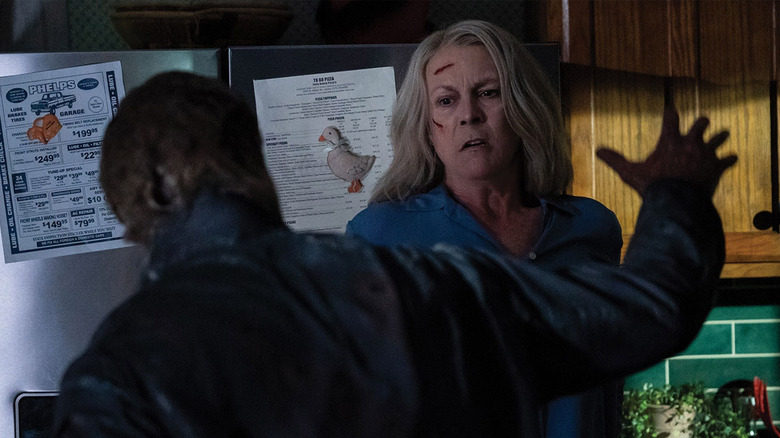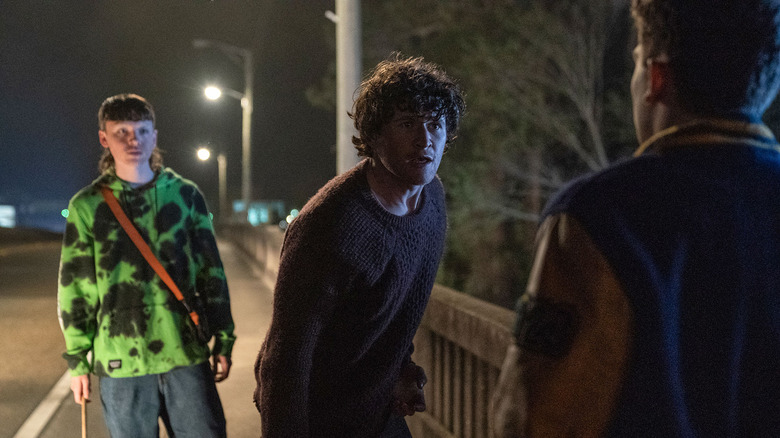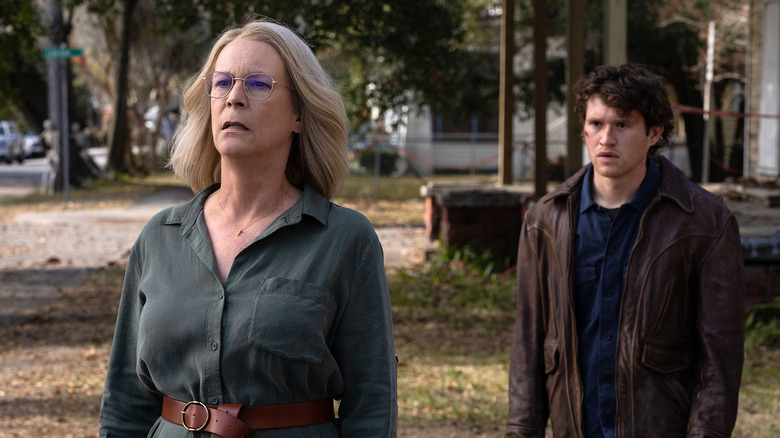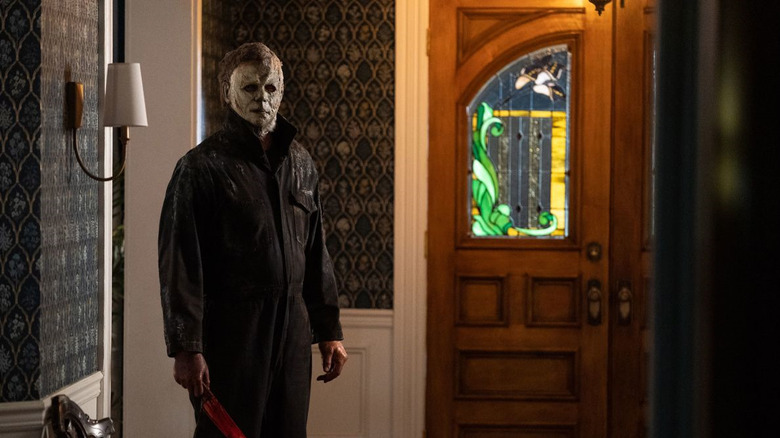Halloween Ends Spoiler Review: A Big Swing That Does Laurie Strode Wrong
The "Halloween" franchise is cyclical. Ever since John Carpenter's original made a splash in 1978, producers and franchise custodians have been hoping to catch lightning in a bottle again by returning to the same fundamental premise: psychopath Michael Myers cuts a brutal swath through a town of innocents on Halloween night. It's been attempted before without original final girl Jamie Lee Curtis as the eternally-stalked Laurie Strode, but this time she's along for the ride in David Gordon Green's revival "H40" trilogy, which gets rid of all pesky sequels in between '78 and now.
Myers' return to Haddonfield and subsequent killing spree was spread over Green's "Halloween" and "Halloween Kills," and "Ends" picks up a year after those events. Laurie's daughter is dead along with a handful of Haddonfieldians, and a severely injured Michael has once again eluded death. The Boogeyman resurfaces in the present day upon meeting a tormented young man who might share his taste for murder.
It's become clear that any truly "final" movie in this film series must conclude with a final showdown between Laurie and Michael, the masked man who changed her life four decades ago. But you can't have an hour and fifty minutes of Laurie vs. Michael, so Green, along with co-writers Danny McBride, Paul Brad Logan, and Chris Bernier, have offered a new character to watch, part sidekick to Myers and avatar for him. The avatar is necessary since those middling (now-discarded) sequels between 1981 and 2018 hammered home two hard lessons: first, that Michael Myers is necessary for a proper "Halloween" film, and that pathologizing Michael Myers takes the fun out of this sort of horror movie. "Ends" does provide a definitive conclusion to the final girl-vs-monster saga, but carries within it a rushed, anemic subplot that throws the movie off its axis.
Corey
On Halloween night in 2019, Corey Cunningham (Rohan Campbell) accidentally caused the death of a child he was babysitting, and now he's the town pariah. The boy's mother blames him and claims the killing was intentional, and the boy's father noted that Corey had something dark in his eyes, perhaps the Devil's eyes. Laurie sees it too; it's a source of tension between her and her now-orphaned granddaughter Allyson (Andi Matichak), who falls for Corey within minutes of meeting the repressed boy.
The dynamic between Corey, Laurie, and Allyson is more fascinating than that of Laurie and Michael, which isn't easy in these movies. Campbell's deadened stare enables him to be the one person who Michael allows to live and, the film surmises, possibly take up the baton from the aging slasher icon. Funny enough, this was attempted before in the maligned (and discarded) "Halloween 4," with a young niece of Michael grabbing a butcher knife and killing a family member.
This time the arc is more satisfying; Corey's dalliance with Allyson essays John Carpenter's "Christine," with Carpenter himself — along with son Cody Carpenter and Daniel Davies — lacing synth pulses and a rebel streak into the soundtrack. The problem is that this tale of star-crossed lovers is anemic. Not long after meeting and riding around town, they're ready to "burn it all down" not long after in a rushed story that wraps up when it should have been setting up. Corey kills again, but was that urge always there, just waiting to untether itself? Green doesn't look too hard for an answer. It's clear by the film's end that Corey won't be getting a trilogy of his own, and the idea of natural vs nurtured evil he brings dies with him before it can develop.
Laurie
"Ends" is missing a prominent franchise character, Dr. Loomis, played to perfection by Donald Pleasence before Tom Jones Jr. took up the mantle in "Halloween Kills." The Ahab to Myers' white whale, Loomis would spend nearly every "Halloween" movie shouting to all who would hear it (few would) that Myers was not just a guy in a mask, he was the embodiment of pure evil with "the blackest eyes, the Devil's eyes."
With Loomis sidelined and then gone in the H40 films, Laurie filled that space with a harbinger's zeal. She would warn anyone who would hear her (few would) that Myers was a rabid dog that needed to be put down – at least, she would for the first two films. Green's "Halloween" and "Halloween Kills" both made much of re-mythologizing Michael; high-gravity lines like "Michael ... you've come home" and "Evil dies tonight" worked in tandem with meticulously constructed massacre sequences to ensure that Michael was once again larger than life, leagues away from the inert doofus that once suffered blows from Busta Rhymes.
But by the time "Halloween Ends," Laurie changes her tune. After all she's been through, she describes Michael in her memoir as "just a man in a mask," and that's as far as the trauma unravels. There's a bizarre tonal shift that tries to gaslight both audience and Laurie into believing she is to blame for the events of the previous two films, that her obsession with Michael somehow conjured him. It's not the underwhelming terminus to Laurie's story seen in "Halloween: Resurrection," but it's a treacherous pivot from the exploration that "Halloween" was going for in 2018, and a baffling choice. Laurie, the beating heart of these movies, deserved a better sendoff. She sure gave Michael his.
What was it for?
With that said, Laurie spent the runtimes of "Halloween" and "Halloween Kills" dealing with said trauma and generally fighting for her life, "Ends" sees her in a more zen state. It's not just the memoir and her willingness to lay out her past; she gets a chance to participate in the life she might have had earlier, had it not been for one tragic night forty years ago. She gets to flirt like a schoolgirl with Will Patton's Deputy Hawkins, cracking jokes and reminding everyone that scary movies haven't dulled the comedic chops of the "Knives Out" and "Everything Everywhere All At Once" star. This restorative Laurie is perhaps the greatest update Green & Co. have gifted to the franchise.
Once Laurie and Michael finally go toe-to-toe, it happens almost as an afterthought. By shifting the focus to Corey for the bulk of the film, Michael is largely sidelined, another strange decision after the myth-making expended to make Myers towering and terrifying in "Halloween Kills." Where he was slaughtering a squad of firemen in the last movie with ease, here he cowers underground, a whimpering downgrade of the monster that David Gordon Green took so much time in his previous two films to build up in accordance with Carpenter's faceless, primal Boogeyman.
What was it all for, this revival? The 1978 movie and the story it tells draws to a close in "Halloween Ends," but without enough justification for Michael to don the mask again in the first place. Green made a movie about a woman's lingering trauma and whether a killer can be constructed, but discontinues both concepts by the end, leaving us as grateful as the people of Haddonfield that evil finally did die tonight.



